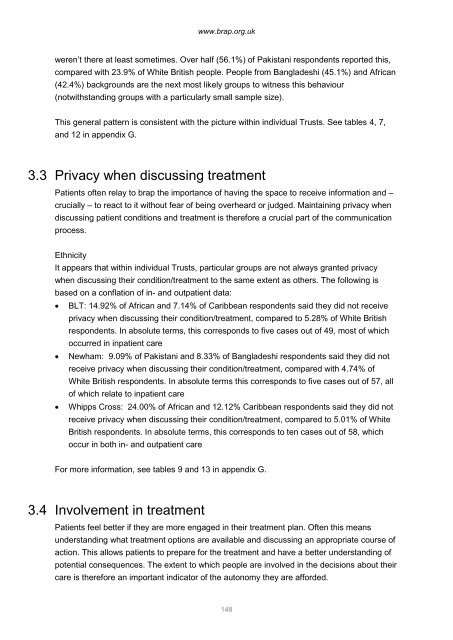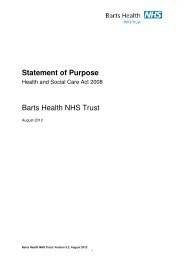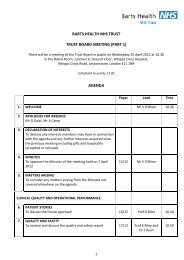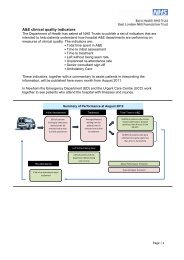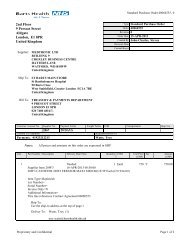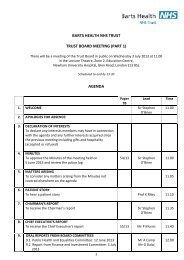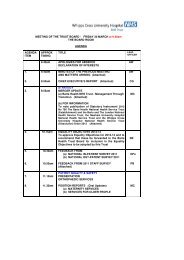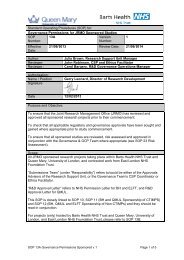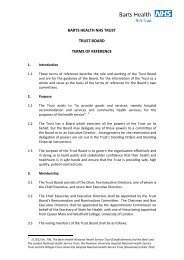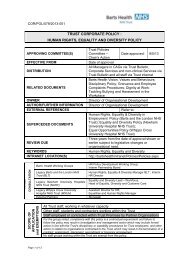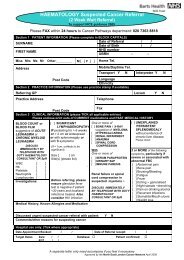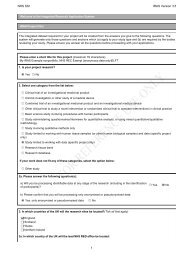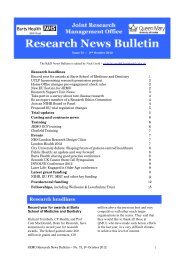Barts Health Equality and Human Rights Impact Assessment Report
Barts Health Equality and Human Rights Impact Assessment Report
Barts Health Equality and Human Rights Impact Assessment Report
- No tags were found...
Create successful ePaper yourself
Turn your PDF publications into a flip-book with our unique Google optimized e-Paper software.
www.brap.org.ukweren’t there at least sometimes. Over half (56.1%) of Pakistani respondents reported this,compared with 23.9% of White British people. People from Bangladeshi (45.1%) <strong>and</strong> African(42.4%) backgrounds are the next most likely groups to witness this behaviour(notwithst<strong>and</strong>ing groups with a particularly small sample size).This general pattern is consistent with the picture within individual Trusts. See tables 4, 7,<strong>and</strong> 12 in appendix G.3.3 Privacy when discussing treatmentPatients often relay to brap the importance of having the space to receive information <strong>and</strong> –crucially – to react to it without fear of being overheard or judged. Maintaining privacy whendiscussing patient conditions <strong>and</strong> treatment is therefore a crucial part of the communicationprocess.EthnicityIt appears that within individual Trusts, particular groups are not always granted privacywhen discussing their condition/treatment to the same extent as others. The following isbased on a conflation of in- <strong>and</strong> outpatient data: BLT: 14.92% of African <strong>and</strong> 7.14% of Caribbean respondents said they did not receiveprivacy when discussing their condition/treatment, compared to 5.28% of White Britishrespondents. In absolute terms, this corresponds to five cases out of 49, most of whichoccurred in inpatient care Newham: 9.09% of Pakistani <strong>and</strong> 8.33% of Bangladeshi respondents said they did notreceive privacy when discussing their condition/treatment, compared with 4.74% ofWhite British respondents. In absolute terms this corresponds to five cases out of 57, allof which relate to inpatient care Whipps Cross: 24.00% of African <strong>and</strong> 12.12% Caribbean respondents said they did notreceive privacy when discussing their condition/treatment, compared to 5.01% of WhiteBritish respondents. In absolute terms, this corresponds to ten cases out of 58, whichoccur in both in- <strong>and</strong> outpatient careFor more information, see tables 9 <strong>and</strong> 13 in appendix G.3.4 Involvement in treatmentPatients feel better if they are more engaged in their treatment plan. Often this meansunderst<strong>and</strong>ing what treatment options are available <strong>and</strong> discussing an appropriate course ofaction. This allows patients to prepare for the treatment <strong>and</strong> have a better underst<strong>and</strong>ing ofpotential consequences. The extent to which people are involved in the decisions about theircare is therefore an important indicator of the autonomy they are afforded.148


